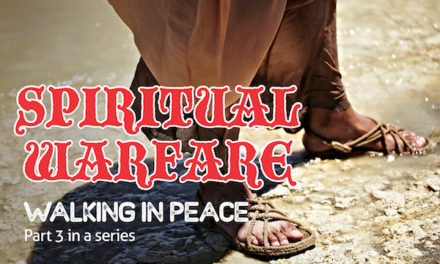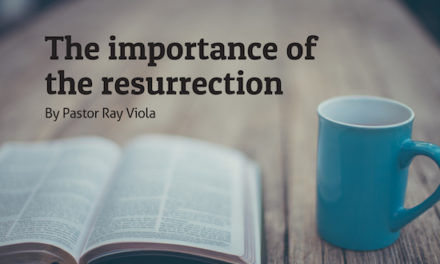“Now I lay me down to sleep;
I pray the Lord my soul to keep.”
This familiar children’s prayer has the right perspective even for adults, for mental cognizance is not a prerequisite to spiritual interaction with God. If it were, God would not be able to ‘touch’ or minister to infants and children under the ‘age of reason’, or to the mentally handicapped or incapacitated (as those with Alzheimer’s). So even when we are physically asleep, God’s children should be spiritually awake because our eternal spirit is not limited to our physical realm. Perhaps this was part of the apostle Paul’s thinking when he exhorted believers: “Let us not sleep as others do” (1 Thessalonians 5:6). After all, God is still God when we are not awake and mentally alert, so why shouldn’t Jesus be Lord over our dreams? Before you nod off, do you ask for His control and protection over your mind as you sleep? We don’t have to stop praising Him when we close our eyes and lay our heads on our pillows! If we belong to the Lord and are surrendered to Him during our waking moments and hours, why not during our sleeping ones also? God can speak and minister to us, warn or instruct us while we sleep, as shown by numerous Biblical examples: 1 Kings 3:5-15; Matthew 2:1,12,13,19-20. Please note that those who had these dreams knew they were not ‘daydreams’ or vain imaginings of their own making, but recognized their validity, reality, and divine origin.
On Pentecost, Peter declared that the prophecy of Joel (2:28) was being fulfilled: “‘And in the last days it shall be, God declares, that I will pour out My Spirit on all flesh, and your sons and your daughters shall prophesy, and your young men shall see visions, and your old men shall dream dreams’” (Acts 2:17). While the occurrence of divine visions and dreams is documented throughout both the Old and New Testaments, this pronouncement for “the last days” (from Pentecost continuing through the present) is that God’s Spirit is directly interacting and communicating with multitudes of individuals instead of just isolated prophets (Numbers 12:6) or particular persons targeted for special instructions or warnings (Genesis 31:10-13,24). In fact, ALL born again believers especially qualify for this relationship with the Holy Spirit since He dwells within us (1 Corinthians 3:16). So, are you ‘tuned in’ on a spiritual channel even when you’ve bedded down for the night? Are you open to hear from the Lord in the wee hours? If you awaken at an odd hour for no apparent reason, do you ask the Lord if He has a prayer assignment for you? Or something He wants to show you? He knows our physical need for rest, but He can sovereignly overrule that and energize us with all that we need to sustain us. In fact, we’d be amazed at how little sleep our bodies actually require if we consistently abide in the Spirit – eating, working, resting in accordance with God’s ways, and truly trusting in His ability and willingness to care for us and meet all our needs. Most people literally wear themselves out with worry and self-effort to meet their own needs!
Biblically, the term “sleep” is used to convey both the repeated, temporary state of physical rest, as well as the separation of the soul from the body in physical death. For those who belong to Christ, the sleep of death brings the sweetest of all realities since they are immediately in the presence of their Lord (Philippians 1:21,23). But the reality of God’s presence is not just to be anticipated in the future, for He is the “I AM” (Exodus 3:14) who has promised to always be with His followers (Matthew 28:20). Paul said that Jesus died for us, “that whether we are awake or asleep, we may live together with Him.” (1 Thessalonians 5:10) So, whether physically dead or alive, whether mentally alert or taking a rest, we can have fellowship with our God, which is His plan and desire for us (1 Corinthians 1:9). “I awake, and I am still with You” (Psalm 139:18b), David wrote, implying communion with God while asleep. Furthermore, King Solomon, the wisest man who ever lived (1 Kings 3:10-12), taught, “It is vain that you rise up early and go late to rest, eating the bread of anxious toil; for He gives to His beloved sleep.” (Psalm 127:2) Jehovah Jireh takes the responsibility of providing for ALL the needs of His children (Philippians 4:19), even that of physical and mental rest. Since He never slumbers nor sleeps (Psalm 121:4), His provision for us is not limited to when we’re awake and aware of Him, so His blessings come even as we snooze! Therefore, for God’s people to labor and strive in our own strength and understanding to meet needs (ours or others) is both arrogant and futile, because it is those who trust in the Lord who will receive and experience the necessary amount of rest (Matthew 11:28-30).
It is interesting that the first Biblical reference to sleep is found in Genesis 2:21, even before sin began its corrosive work upon mankind and the deterioration of the physical body demanded ‘down time’ for re-energizing. “So the LORD God caused a deep sleep to fall upon the man”. God directed Adam’s state of unconsciousness for a divine purpose, namely, to meet a need that Adam was unable to fulfill himself. In another occurrence, Genesis 15:12 records that “a deep sleep fell upon Abram.” However, this condition was accompanied by “dreadful and great darkness”. God, nonetheless, spoke to Abram both a personal promise and a national prophecy (vv.13-16). Dreams and their divine interpretation were a means acceptable to both saints and pagans in Old Testament times that God used to make known His plans and intentions for future events. Remember Joseph’s dreams that fueled his brothers’ hatred of him (Genesis 37:5-11), and his rise to prominence in Egypt through his interpretation of dreams (Genesis 41:1-45)? Or how about the dreams and visions of Nebuchadnezzar (Daniel 2,4) and Daniel (Daniel 7,8)? While Joseph’s and Pharaoh’s dreams have become ancient history, those recorded by Daniel have not yet been completely fulfilled, for they laid out all the major empires of Gentile history from both man’s (through the king) and God’s (through Daniel) perspectives.
Perhaps the most wondrous and encouraging dream in the Bible was the one Jacob had when the LORD spoke to him from above the ladder the angels were using (Genesis 28:10-16). He was fleeing from home in fear of his irate brother, and probably felt pretty lonely, uncertain, and discouraged in the wilderness that night. But God met him right where he was, revealing Himself and wonderful promises to the weary traveler as he slept. When Jacob awoke he no longer feared his brother but God (v.17), and his purpose changed from running away from a problem to seeking after God’s promises. The Bible even records that he began his adventure with God by “(lifting) up his feet” (29:1 – NASB). He was happy! That’s what happens in an encounter with God, who is still omniscient and omnipotent, compassionate and gracious, and present with His children. “The Lord is at hand.” (Philippians 4:5b) He is touching our lives and holding us firmly in His loving hand. “I am the LORD; … I will take you by the hand and keep you” (Isaiah 42:6). He watches over us day and night to protect, provide for, and preserve us for His good and eternal purposes. “Fear not, for I am with you; be not dismayed, for I am your God. I will strengthen you, I will help you, I will uphold you with My righteous right hand.” (Isaiah 41:10) That assurance should give us sweet dreams indeed!






